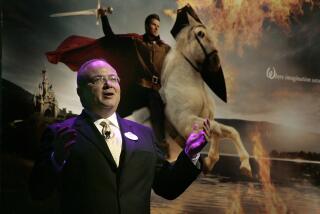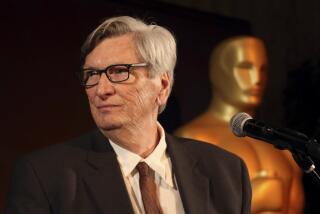TV academy chair won’t seek 2nd term
- Share via
Bryce Zabel, chairman of the Academy of Television Arts & Sciences, said Wednesday that he won’t seek a second two-year term -- a decision that comes after presiding over the organization through the twice-postponed 2001 Emmys as well as bare-knuckled negotiations for the awards’ new broadcast deal.
Zabel’s surprise announcement comes a few days after Tribune Entertainment President Dick Askin became a candidate to lead the nonprofit group, which is principally known for presenting the prime-time Emmy Awards. Askin sent a letter to governors saying he had agreed to run after several members urged him to consider pursuing the voluntary post.
The election will be held in August, with Zabel’s current term expiring in September. The academy’s last three elected leaders -- Meryl Marshall Daniels, Richard Frank and Leo Chaloukian -- all served back-to-back terms totaling four years apiece.
Zabel said Askin’s challenge was not a factor in his decision, stating the academy has accomplished a great deal during his tenure and that he is eager to devote his full energies to his career as a writer-producer. “I’m ready to move on,” he said. “I’ve had two terms jammed into one.”
Others within the group say it would have been difficult for Zabel to win reelection given the internal opposition he faced. Chaloukian -- presently the group’s treasurer, who has opposed him on various issues -- said Zabel’s decision not to run is “in the best interests of the academy.”
Zabel’s action leaves time for new candidates to challenge Askin, whose company is a unit of Tribune Co., owner of the Los Angeles Times.
Although the academy has roughly 12,000 members, the voting for chairman is limited to fewer than 70 of them, consisting of the board (with two governors representing each of 27 peer branches) as well as an executive committee of appointed and elected officers.
Zabel’s tenure began with the postponement of the Emmys -- scheduled to air days after the Sept. 11 terrorist attacks -- first to October and then November. Not long after the show aired, the academy opted not to renew the contract of its full-time president, Jim Chabin, deeply dividing the board.
In November, the academy faced the threat of a network boycott when pay service HBO made a bid to acquire Emmy telecast rights. The academy ultimately secured a new eight-year, $52-million agreement in which the ceremony will continue rotating among the four major broadcast networks, more than doubling the value of the previous contract.
The academy also remains embroiled in a dispute with its New York-based counterpart, the National Academy of Television Arts & Sciences, over the latter’s desire to establish a Spanish-language Emmy ceremony. That matter is currently in arbitration.
Academy President Todd Leavitt, who took that job last summer, said Zabel had been “very effective” and led the organization through “a tremendous period of productivity.”


